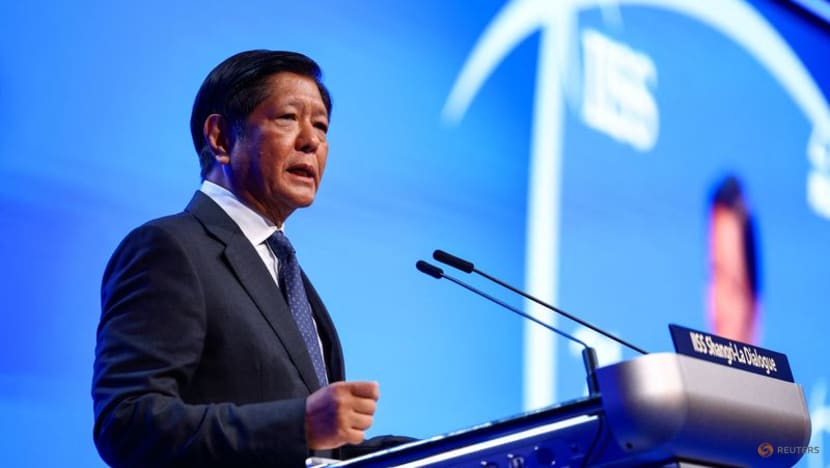US presence crucial to regional peace, says Philippines' Marcos in Shangri-La Dialogue keynote address
The US-China contest is exacerbating flashpoints and has created new security dilemmas, says Philippine President Ferdinand Marcos Jr.

Philippine President Ferdinand Marcos Jr delivers a keynote address at the Shangri-La Dialogue in Singapore on May 31, 2024. (Photo: REUTERS/Edgar Su)
SINGAPORE: Philippine President Ferdinand Marcos Jr said on Friday (May 31) that the presence of the United States was "crucial to regional peace", as the Southeast Asian country faces growing Chinese pressure in waters off its coastline.
Marcos has sought to deepen defence cooperation with the US as he stands up to Chinese actions in the South China Sea, which Beijing claims almost entirely.
Speaking at the opening of the Shangri-La Dialogue in Singapore, a major security forum attended by defence ministers from around the world, Marcos said that the Philippines and other Southeast Asian countries had a vision for "peace, stability, and prosperity" in the South China Sea, but that this was being undermined by other actors, without naming China.
"Unfortunately, this vision remains for now a distant reality. Illegal, coercive, aggressive, and deceptive actions continue to violate our sovereignty, sovereign rights, and jurisdiction," Marcos said.
In his speech, Marcos also said that "China's determining influence over the security situation and the economic evolution of this region is a permanent fact".
"At the same time, the stabilising presence of the United States is crucial to regional peace. It's never a choice. Both countries are important," he added.
SECURITY IN THE SOUTH CHINA SEA
Marcos called security in the South China Sea, through which a huge volume of trade passes, a global issue.
A reporter asked Marcos whether China would be crossing a "red line" if one of its coast guard ships killed a Filipino with water cannons.
"If a Filipino citizen was killed by a wilful act, that is very close to what we define as an act of war," Marcos replied. "We would have crossed the Rubicon. Is that a red line? Almost certainly."
The Philippines, a treaty ally of the US, is a key focus of Washington's efforts to strengthen alliances and partnerships in the Asia-Pacific region as it seeks to counter China's growing military might and influence.
Given its position in the South China Sea and proximity to self-ruled Taiwan, which China claims as its own, Philippine support would be crucial for the US in the event of any conflict.
The Philippines expanded a 2014 agreement last year to give US military access to another four of its military bases, taking the total number to nine, including two in the far north of the country, less than 450km from Taiwan.
The Enhanced Defence Cooperation Agreement (EDCA) also allows US troops to rotate through and store defence equipment and supplies.
US-CHINA RELATIONS
The US' growing presence in the region and its regular deployment of warships and fighter jets in the Taiwan Strait and South China Sea have infuriated China's leaders in Beijing.
China has accused the US of using the Philippines as a "pawn to stir up trouble in the South China Sea".
Earlier on Friday, US Defence Secretary Lloyd Austin and China's Defence Minister Dong Jun met in Singapore on the sidelines of Asia's premier defence summit.
During the meeting with Dong, Austin underscored the importance of freedom of navigation under international law, especially in the South China Sea, according to a Pentagon statement released after the meeting.
Dong responded by telling Austin that the US was stoking tensions through its military presence in the region, his spokesperson told reporters.
Marcos said tensions between the US and China were destabilising for Southeast Asia, calling on Washington and Beijing to work harder to resolve disputes.
"Their rivalry is constraining the strategic choices of regional states. Their contest is exacerbating flashpoints and has created new security dilemmas," Marcos said.
"The continued stability of this region requires China and the United States to manage their rivalry in a responsible manner."
Manila and Beijing have a long history of maritime territorial disputes, but tensions have worsened under Marcos, who has insisted the Philippines will not give up a "square inch of our territory".
Marcos said on Friday that the South China Sea dispute is an issue that goes beyond the Asia-Pacific region.
"The peace and stability of the South China Sea and the freedom of navigation in the South China Sea is a world issue," Marcos said.
"It is not just (about) ASEAN member states. It is quite easy to see that it is in fact the world that has become the stakeholder."
















